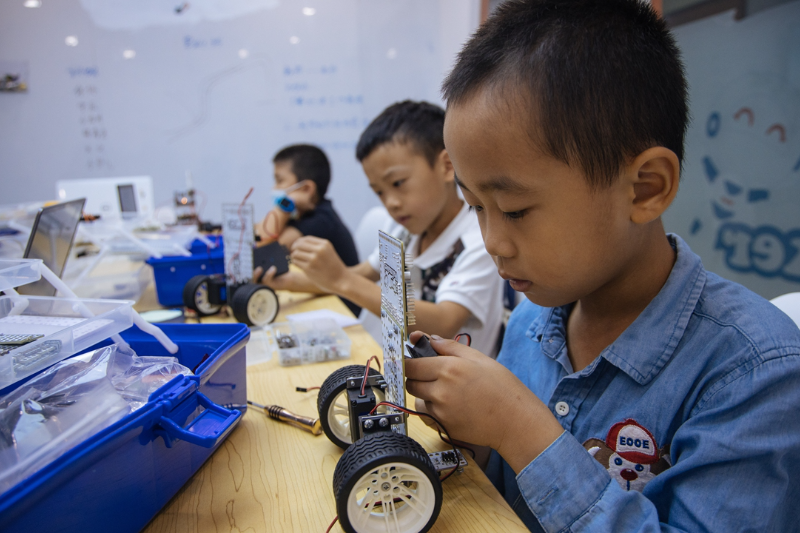

china’s quiet pivot on private tutoring relaxing regulations to boost economy
Three years after a government crackdown destroyed China’s private tutoring industry, Beijing is softly shifting its stance. Free from official proclamation, the government has allowed a creeping revival of private tuition, an industry formerly valued at $100 billion and employed hundreds of thousands. Clearly demonstrated by industrial activity, this modest policy move emphasizes China’s immediate need to support job creation and stabilize her faltering economy.
China launched the “double reduction” policy in 2021 designed to reduce educational and financial load on families by banning for-profit tutoring in fundamental courses. The law severely affected major businesses as TAL Education Group and New Oriental Education & Technology Group as well as resulted in significant financial losses and mass layoffs. Demand for tutoring services remained strong despite its impact since parents, determined to provide their children an advantage in the very competitive education system, maintained looking for after-school support.
Michelle Lee pays over 3,000 yuan ($420) monthly for her children’s after-school activities among many parents in southern China who still heavily spend on tutoring. “Tutoring centers run in hiding when the policy first came out,” she said. They have, however, lately opened significantly more freely. Recent studies and industry insiders point to tutoring centers experiencing higher security, which represents Beijing’s orientation toward job stability and economic development.
Among the faint signs of this policy shift are declining municipal inspections, rising active tutoring licenses, and government-backed activities supporting the industry. Aiming at raising domestic spending, the State Council, China’s central government, integrating educational programs into a 20-point agenda in August, This follows previous guidelines specifying permissible forms of off-campus tutoring, notably in non-core courses.
Once more, New Oriental and TAL Education hired hundreds of personnel; in the first half of 2024, the number of licensed tutoring centers grew over 11%. Companies claim they are cautiously hopeful about running with a “wider pathway” even if the industry still has tight policies thus long they avoid forbidden core-subject tuition. Beijing’s new focus on stability and job creation over strict control indicated by the implicit softening signals, even though the ministry of education has not yet explicitly replied on the changing regulatory environment.
Many reintroduced their products under other names or focused on non-core subjects while tutoring facilities changed to follow the rigorous regulations. For instance, several tutoring companies provide science courses in English to get over restrictions on core-subject tuition; mathematics is nowadays encouraged as “logical thinking.” Reorienting her teachings toward scientific-related subjects, English teacher Lisa from Zhejiang Province claimed she maintained her institution running. Although private, one-on-one tutors are still a popular but costly substitute for many parents, this original approach has helped some smaller tutoring centers continue.
For Shanghai mother of two Tang Zengdong, the policy shift has alleviated certain household challenges. She worries, meanwhile, that only rich homes will be able to afford private instruction, therefore worsening the educational gap. She noted that the expense of private teachers, up to 800 yuan a session, limits options for budget-conscious families, therefore inadvertently increasing the disparity between rich families and everyone else.
Rising young unemployment spurred on by nearly 11 million new university graduates joining the workforce drives Beijing’s laid-back mentality most of all. Professionals in the sector think the field of education could offer a solution for this issue. Head of the Asia Education Practice at Oliver Wyman, Claudia Wang argues that the ability of private tutoring to absorb part of the workforce corresponds with the current government economic priorities.
The change in policy is shown by the performance of the education sector: TAL Education and New Oriental’s average levels of shares since 2021 have reached Still below pre-crackdown norms, this recovery points to a measured optimism. Industry companies are reopening learning centers, hiring more teachers, and constantly monitoring policy developments in order to meet regulatory expectations.
The evolving view of private tutoring reflects China’s larger general economic balance. Although Beijing first gives economic stabilization top attention, chief economist for Greater China at ING Lynn Song pointed out that the regulatory approach has shifted from restrictive to supportive. This shift underlines China’s need of balancing regulatory control with sustainable economic growth.
While private tutoring company operators are experiencing more freedom, the industry is still under close oversight and companies are cautiously maneuvering this difficult environment. While noting “significant risks” due to regulatory uncertainties, the most recent annual report from New Oriental emphasizes initiatives to cooperate with authorities.
Rising in China, private tutoring reflects a mix of social adaptation, financial need, and family resilience—that of families resolved to provide their children a decent future. Although the government has not yet completely embraced the policy adjustment, the pragmatic relaxation is clearly an attempt to combine the goals of reducing educational pressure with the needs of economic growth and employment stability. Private tutoring in China will most likely include constant oversight but with more leeway for companies to operate as China alters its economic environment.
Families and educators both remain skeptical but hopeful, closely watching Beijing as it balances the competing goals of regulatory control and economic growth without state support of private tutoring.
The Martz Gold Line workers in Maryland marched out one early Thursday morning for the strike. They made their point…
Under a new partnership Ghana and the World Bank work to develop a Growth and Jobs Strategy that opens up…
Google has made remote work limits stricter by telling its workers that office work is required or they could risk…
The legislature of Connecticut has planned to move forward with the bill that would provide unemployment benefits to the people…
British Steel has issued the layoff notice of 2,700 employees, giving the steelworkers great relief. With the UK government intervening…
According to Reuters energy major ConocoPhillips says it will cut staff as a major result of its $23 billion purchase…
This website uses cookies.
Read More